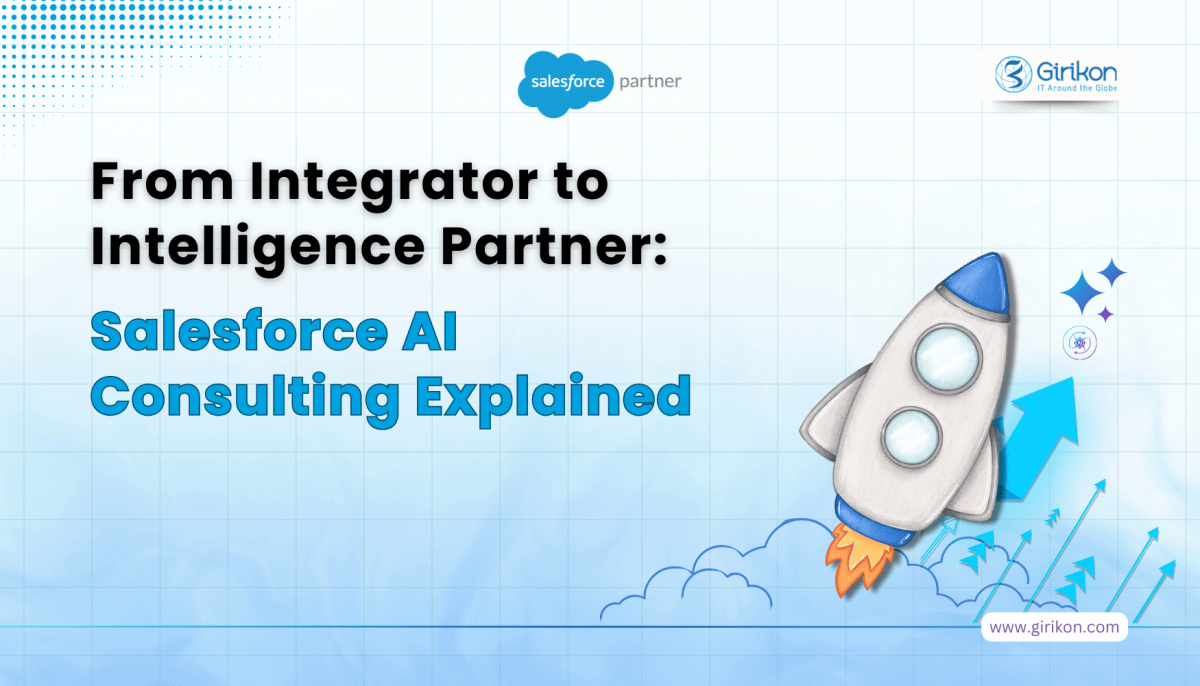The success of a business lies in healthy revenue growth. An organization's revenue growth is affected by various aspects, including sales, finance, operations, and partnership management. It is essential to create harmony among all the departments to attain sustained growth through a unified approach. Post the 2020 global crisis and the fall-out of revenue due to the disruption of sales, B2B businesses are seeking frictionless ways to boost business growth. The sudden change in customer needs, unreliable forecasting of data, stalling of deals combined with other business challenges are pushing organizations to refurbish their revenue regulation strategy.
This calls the need for a system that offers a single point of reference that streamlines end-to-end sales, renewal, and billing, and this is what Salesforce Revenue cloud attains. To integrate the Salesforce revenue cloud with other systems, organizations must consider using Salesforce integration services.
What is Salesforce Revenue Cloud?
Salesforce Revenue Cloud is a suite of products that help businesses streamline the functioning of sales, finance, and operations teams together. The robust platform provides organizations with a single source of information and access to multiple channels while ensuring a smooth customer journey. With Revenue Cloud, organizations get complete control over their firm's revenue growth while ensuring interesting possibilities with AI-driven insights. Apart from this, it helps organizations reimagine their lead-to-revenue architecture and provides multiple tools, which they could use to identify and acknowledge opportunities to improve the revenue cycle.
What are the Benefits of Salesforce Revenue Cloud?
Single Point of Access: One of the significant benefits of the Salesforce Revenue cloud is that it conveniently enables users to access every element in a single place. With this, users do not have to delve through multiple applications to find the information they need.
Brings forth New Streams of Revenue: Revenue cloud can be leveraged by organizations with complex revenue models as their business processes are stretched unnecessarily. These redundancies can be removed with the help of the Salesforce Revenue cloud. With its in-built billing system, the platform brings together a unified product catalog while creating new revenue streams.
Manual Work is Eliminated: The automated features of this cloud platform eliminate the need for performing manual work processes such as data reconciliation, transcription of orders, and more. Apart from this, the need to manually download dated order forms is eliminated as all the relevant details, including customers' purchase history, are displayed on a dashboard.
Future-ready: Organizations leveraging the features of Salesforce Revenue cloud evolve into agile entities by making informed decisions while helping them reach the next level. This helps in accelerating revenue growth and prepares them to become future-ready.
Optimizes Performance: When leveraged, the cloud-based platform ensures process efficiency besides augmenting the revenue lifecycle. The platform provides organizations with a comprehensive view of all the activities, including but not limited to creating orders, invoicing, and more. It also ensures the effective functioning of the ERP system for driving customer engagement.
Final Words:
Salesforce Revenue Cloud is an all-encompassing suite of solutions that assures a huge surge in revenue growth while aiding teams to simplify business processes such as finance, sales, and partnership management. Besides being flexible and scalable, it easily adapts as per organizational requirements and offers better process visibility. Businesses should consider contacting one of the best Salesforce consulting partners to know more about this amazing platform.
In today’s digital era, businesses across different industry verticals are leveraging technology solutions to manage their business processes and streamline operations, and the financial services industry isn’t any exception. The shift towards digitization has pushed the financial services sector to accelerate its processes by leveraging robust technologies and adopting digital transformation initiatives such as cashless payments.
According to a survey conducted by Gartner, around 67% of senior finance leaders advocate the need for digitalization and focus on the optimization of finance technology.
Apart from this, other disruptive technologies such as Robotic process automation; Artificial intelligence, cloud services, and other financial business models have made their way. One such technology solution is the financial services cloud by Salesforce that provides tailored services to enterprises. The Salesforce financial services cloud has helped wealth management stakeholders ensure enhanced customer satisfaction through accelerated digital transformation. It is essential to seek Salesforce support to know more about this robust platform.
What is Financial Services Cloud?
The Financial service cloud is a platform provided by Salesforce and is available in the Lightning Experience. The platform is designed to create long-term customer relations while helping financial consultants offer high-end services. The cloud platform runs in a secure environment and can be leveraged by organizations to manage the assets and liabilities of their customers besides the accounts of investment and wealth management firms.
The platform is ideal for small and large enterprises as it allows financial advisors to deliver high-end solutions and technologies with tailor-made services. The platform is endowed with advanced features that enable consultants to spend less time gathering doing mundane tasks and focus on providing high-end assistance. The Financial service cloud encompasses several sub-verticals such as banking, mortgage, insurance, wealth management, and more.
Features Offered by Financial Service Cloud:
Enables Commercial Banking: Salesforce Financial Service Cloud facilitates commercial banking visibility in various aspects of wealth and finance, making it easy for consultants and relationship managers to make business-to-business referrals. This feature provides relationship managers with a customized layout that offers an optimum display of data and permission sets to access the Commercial Banking application. This allows relationship managers to manage their mortgage reports, referrals, treasury management, etc., more efficiently.
Helps Achieve Compliance: The Cloud infrastructure has helped organizations monitor customer relationships while following every interaction with a customer data model at the heart of the financial services cloud, which helps achieve compliance. The robust cloud solution helps the clients find new customers, grow their accounts, and close deals quicker while ensuring the security of client data and assessable client interactions across several channels.
Provides Better Visibility: Companies can access client profiles to view client interactions and the information shared. With this, the wealth ecosystem of the clients and their families can be accessed, allowing financial consultants to grow their business across multiple channels. This insight provides relationship managers a better know how of the personal and financial product needs of the customers and how it can be used to achieve their goals.
Enables Data Security: Before adopting new technology, organizations must fortify the security infrastructure. The Salesforce financial service cloud ensures robust security infrastructure for clients who have to undergo stringent security checks, inspections, and audits at regular intervals.
The Bottom Line:
Salesforce financial cloud built on the Salesforce CRM platform has revolutionized the wealth management ecosystem. The robust cloud solution enables the wealth management team members to access information drawn from various sources, including the financial interactions of clients. This provides companies with a 360-degree view of the client. So, if you wish to deploy Salesforce financial cloud for wealth management, you must partner with a certified Salesforce consultant.
Compared to yesteryears, customers today are more aware and informed and thus expect a personalized experience besides quality services and products. Since customers are the lifeblood of every business, retaining them, especially the existing ones, is crucial as they spend 31 percent more than the new ones. This calls for a robust customer retention strategy that will not just ensure an increase in revenue but also a decrease in overall cost. It is possible to acquire a higher level of customer retention by implementing a robust CRM (Customer Relationship Management) platform like Salesforce.
According to a survey conducted by Salesforce, it has been revealed that acquiring new customers or clients is more expensive than retaining the existing one.
How to Boost Customer Retention Using Salesforce?
Tracking Customer Interaction: It is possible to keep track of your customers with Salesforce integration. From where your customers are, when they made the last purchase to what they are looking for on your website, Salesforce helps you know everything about your customers and prospects. This will help you understand customer behavior and preferences while helping you respond to their needs appropriately. Moreover, you will be able to engage with your customers by sending them personalized messages/emails while introducing them to your products and services.
Unify the Database of Your Customers: Since Salesforce helps gather, organize, and analyze all your customer data in a single location, which helps in customer retention. Your sales team will access all the data easily while staying informed. With this, data accuracy is increased, and data duplicity is reduced. Moreover, client satisfaction is ensured as transparent communication is ensured between business and customers. By partnering with a Salesforce consulting company, you will be able to make the most of this fantastic platform.
Power of Personalization: For every business, customer data is a mine of gold. By centralizing this wealth of data to be personalized later, it is easy to resonate with your customers. By leveraging Salesforce integration services, you will be empowered to take control of your customer relationship by using tools such as Pardot dynamic content that allows you to personalize emails, subject lines, and more. By personalizing communication, you show your customers that you care for them.
Engaging Inactive Customers: Salesforce enables you to interact with inactive customers by keeping track of their customers by consolidating emails, calls, etc., by checking their purchase history and buying preferences, keeping them engaged via personalized messages, and more. This way, you will save money and acquire new customers.
Integration of Customer Service Tool: Several customer service applications such as service cloud, desk.com, etc., offered by Salesforce can be leveraged to eliminate silos ensure collaboration between teams, especially the account management and customer service departments. By leveraging these tools, overall customer experience can be improved.
Quick Wrap-up:
Businesses should consider harnessing the power of Salesforce to grow their revenue and profit. So, make sure you get in touch with a certified and reputed Salesforce implementation partner to ensure the successful implementation of this platform, which will ultimately help you retain your customers and build a strong relationship with them.
In this internet-driven era, customers prefer quicker and personalized communication, which can be made possible with a mobile app solution. From providing timely assistance to answering queries and sending personalized offers, a mobile app can help organizations be there for their customers when they need the most. Though text messaging is one of the most effective modes of communication, it becomes more effective when integrated with a robust CRM like Salesforce.
One such Salesforce SMS App is the Smart SMS App that empowers users to enjoy multi-channel conversations with bulk messaging, two-way messaging, personalized communication, messaging templates, and more. Listed below are some of the benefits of the Salesforce Text Messaging App and why businesses should consider installing them:
Engage Customers Globally: A Salesforce integrated SMS App can empower users to improve customer engagement and reach global reach through personalized SMS. Since people are usually on their phones most of the time, reading the message is very high. Moreover, service reps are also empowered to provide better customer experiences irrespective of where customers are.
Improved Read rate: Since text messaging offers a read rate of 98%, it is a great way to ensure that customers read your message as it leaves behind email marketing.
Know your customers better: Users can get feedback from their customers through surveys. Research conducted reveals that about 31% of customers respond to surveys through text.
Empower Businesses: The robust App empowers the marketing, sales, and customer service team to deliver an outstanding customer experience. Being a Salesforce integrated App, users no longer need a third-party application to run their SMS efforts as they even manage their messages directly from channels here.
How does SMS Apps work with Salesforce?
Salesforce integrated SMS messages can be used to ensure agent-to-customer conversations through automated methods such as bots and campaigns. Users can now set up long code channels to send a message to their company, and their agents can reply from the Service Console. In case they wish to one-time alerts and recurring messages, they require setting-up short-code channel.
Essential Features:
Salesforce integrated Apps are helpful for all types of businesses as it enables a more effective communication channel. It allows users to automate triggered SMS while customizing the responses.
Multi-channel Integration: This App helps users manage all the messages coming from different platforms in a single platform. It can connect seamlessly to other communication apps such as WhatsApp, Facebook Messenger, MMS, and more.
Global Reach: The App allows users to SMS to customers across the globe, which is a cost-effective way of communicating with users.
Two-way Sending: The App allows the sending and receiving of messages within your Salesforce platform.
Message Scheduler: The App allows the scheduling of messages, which gets disbursed to intended recipients at the scheduled date and time.
SMS Messaging Templates: The App has in-built message templates that any team member can customize without much hassle.
Final Words:
In a nutshell, it can be inferred that it makes sense to Send SMS from Salesforce to the targeted audience to take customer communication to a new level. When customers are engaged, sales deals are closed more easily.

 +1-480-241-8198
+1-480-241-8198 +44-7428758945
+44-7428758945 +61-1300-332-888
+61-1300-332-888 +91 9811400594
+91 9811400594


















